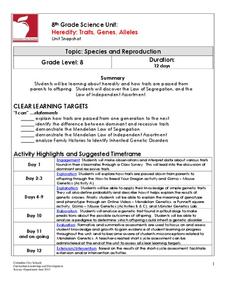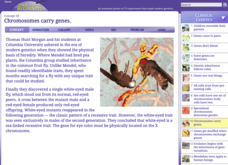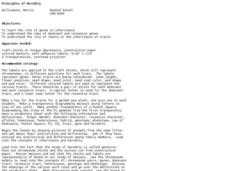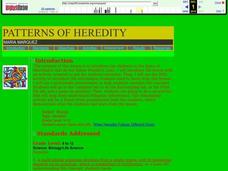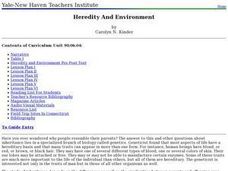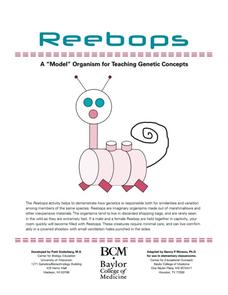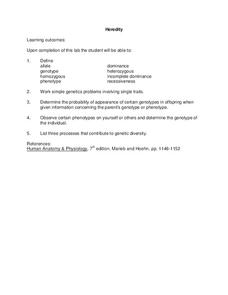Howard Hughes Medical Institute
The Making of the Fittest: Got Lactase? The Co-evolution of Genes and Culture
Got milk? Only two cultures have had it long enough to develop the tolerance of lactose as an adult. Learn how the responsible genes evolved along with the cultures that have been consuming milk. This rich film is supplied with a few...
Columbus City Schools
Heredity: Traits, Genes, Alleles
If you knew people would pay extra for a bald dragon, could you pick which parents you should breed in order to get the highest number? The unit examines heredity and genetics through breeding dragons, mice, dogs, and tries to figure...
Scholastic
Study Jams! Heredity
Mia wishes her blue hair was inherited so that she wouldn't have to dye it, but Sam explains that eye color is. The video does not expound upon the concept of alleles. It does, however, describe inherited traits vs. learned behavior, and...
Oklahoma State University
Hairy Heredity
Young scholars learn that heredity comes down to the flip of a coin with this cross-curricular math and science lesson plan. Using smiley faces as a model, students toss coins to determine which dominant or recessive...
Agriculture in the Classroom
Design 'Y'er Genes
How do changes in DNA affect an organism? Scholars explore chromosomes, genes, DNA, and mutations by modeling the DNA of a strawberry. They build a DNA model, then manipulate it to show how changing the genes transforms the strawberry...
Curated OER
Cut-off Genes
Investigate the relationships between different deep-sea organisms by DNA sequencing. A worksheet provides instructions for DNA sequencing and space to work. They simulate gel electrophoresis by cutting out paper "DNA strands."...
Curated OER
Where'd You Get Those Genes?
Really a unit, this resource exposes middle schoolers to genetics at their level. They read interviews and biographies, trace a family tree, play games that simulate inheritance concepts, and more! Teacher's procedures, student...
Howard Hughes Medical Institute
Got Lactase? The Co-Evolution of Genes and Culture
Does the human body evolve as quickly as human culture? With a stellar 15-minute video, explore the trait of lactose intolerance. Only about 1/3 of human adults seem to still have the enzyme lactase and therefore, the ability to digest...
Curated OER
Variation and Heredity
Junior geneticists tally eye color and height in their lab groups. They examine certain traits in soybean and corn seedlings. For each activity, they gather data and learn about continuous and discontinuous genetic variation. In another...
Curated OER
Raven Chapter 18 Guided Notes: Control of Gene Expression
So often, genetics worksheets focus on alleles and heredity. Here is one that focuses on the steps of the gene expression process. After reading a textbook chapter or listening to your lecture, AP biology buffs write short answers to...
Cold Spring Harbor Laboratory
Chromosomes Carry Genes
Some traits only exist in males and some only in females. Pupils learn how the location of genes on sex chromosomes determines them using an interactive lesson. An animation illustrates how scientists know this to be true and shows how...
Curated OER
Heredity
Learners are introduced to the basic principles of heredity. Through discussion and discrimination activities, they review the role of chromosomes and distinguish between those traits that can and cannot be inherited. High schoolers use...
Curated OER
Families and Heredity
Personality traits and physical appearance traits within families are the focus here. Learners make a poster which lists the shared physical traits they have with their family. Peers look at each poster and write down the traits they see...
Curated OER
Genes within Populations
Finally, here is a genetics worksheet that does not include Punnett squares! Designed for a more advanced class, biology learners will compare Lamarck's concept of evolution with Darwin's. They will explore the Hardy-Weinberg equilibrium...
Curated OER
Principles of Heredity
Students model traits on genes using colored paper and tongue depressors to represent chromosomes. In this heredity lesson plan, students use their "chromosome sticks" to understand chromosome pairs, genes, dominant traits, recessive...
Curated OER
Mendelian and Non-Mendelian Heredity
Tenth graders discuss their physical features, and why they look the way they do. They listen as the teacher discusses DNA, alleles, and dominant or recessive genes. Students perform an experiment with different colored markers...
Curated OER
Heredity-Science Puzzlers, Twisters & Teasers
In this genetics worksheet, middle schoolers complete 9 questions about heredity, genes, and alleles in the form of riddles, word scrambles, word puzzles, and brain teasers.
Curated OER
Heredity Mix 'n Match
Students randomly select jelly beans that represent genes for several human traits such as tongue-rolling ability and eye color. Then, working in pairs (preferably of mixed gender), students randomly choose new pairs of jelly beans from...
Curated OER
Patterns of Heredity
Students describe the differences between incomplete dominance and codominant alleles, and between multiple alleles and polygenic inheritance. They describe how internal and external environments affect gene expression. They then...
Curated OER
Heredity And Environment
Students complete a pre-test on the relationship between heredity and the environment. As a class, they write down descriptions of themselves and identify which traits can be changed and not changed. In groups, they determine which...
Curated OER
The Human Genotype
Six different chromosome activites introduce biology aces to heredity, chromosomal abnormalities, sex-linked traits, and the human genome. The hands-on activites are fairly simple for the teacher to prepare and will prove to be both...
Baylor College
Reebops: A “Model” Organism for Teaching Genetic Concepts
In a sweet simulation, junior geneticists examine the chromosomes of a fictitious Reebop marshmallow animal, combine chromosomes to produce offspring, and then make a model of the resulting Reebop baby. Phenotypes include number of...
Curated OER
Heredity
In this science worksheet, young scholars find the answers to various types of heredity problems. They use the sheet to set goals for completing the unit.
Curated OER
Parental Genes
Eighth graders explore how different organisms pass their traits to their offspring. In this life science lesson plan, 8th graders differentiate recessive and dominant alleles. They predict the phenotype based on the genotype of an...



